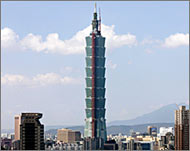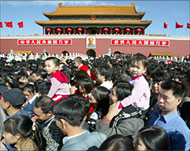Taiwanese wary of independence
With next year’s presidential election in Taiwan on the horizon, the by now obligatory war of words between Beijing and Taipei has begun.

Supposedly united under a “one country, two systems” policy, the electioneering has once again focused attention on the fragilities of this approach.
“The ‘one country, two systems’ policy does not really work. Despite what Beijing says, Taiwan is by and large an independent country,” says Thomas Lee who runs a technology company on the mainland.
“We don’t want to be a part of China; would you want to live under a system that produced the Cultural Revolution and Tiananmen Square?”
Raising the ante
It appears that incumbent Taiwanese president, Chen Shui-bian would agree. Busy pressing the flesh in preparation for next year’s election, his recent series of public speeches have been raising hackles in Beijing.
However, calling for Beijing to stop its military posturing, and announcing plans for a new constitution by 2008, Chen Shui-bian has prompted a series of harsh responses warning him of moving towards any formal declaration of independence.
“Chen Shui-bian should be careful with what he says,” warns Professor Yin Cunyi of the Beijing Institute of Taiwan Studies, a Chinese government think tank.
“Most Taiwanese do not want independence, they want development and stability. The last thing they would want is independence as they would suffer from a war.”
Tension
 |
|
Many Taiwanese fear Chinese |
Divided in 1949 when Chiang Kai-Shek’s US backed Guomindang fled to Taiwan, relationships between the two regions have never been easy.
The establishment of free, democratic elections in 1996 only furthered the exchange of characteristically short and to the point polemics between Beijing and Taipei as China sought to rein in its “rebellious province”.
“Beijing realised that by establishing democracy, Taiwanese nationalist tendencies would only be furthered, and they were right,” explains Dr Philip Yang, political scientist at the National Taiwan University. “Now every aggressive action by China only furthers that identity.”
In 1996, China conducted live fire exercises across the Straits, prompting the US to send a carrier fleet to the area.
In 2000, Taiwanese voters gave Chen Shui-bian a narrow victory, thus ignoring warnings from then Chinese Premier Zhu Rongji that Taiwan should avoid electing a pro-independence candidate.
Beijing’s outlook
 |
|
China does not recognise Taiwan |
Quoting Confucius, Thomas Lee explains why he voted for Chen: “If a big country is to get close to a small country, it needs to show that country mercy and respect. What happened is that when China verbally attacked Chen, people in Taiwan just felt Zhu Rongji epitomised the worst aspects of an authoritarian regime.”
The problem for Lee though, is that China does not recognise Taiwan as a country.
“In China, only the central government has the right to decide the political system of Taiwan,” retorts professor Yin.
“If Taiwan were for example to hold a referendum, then this is not reasonable for the majority of Chinese people. Only if all of China participates can it be called fair.”
Political rhetoric
|
“China would never allow an enemy at its front door” Thomas Lee, |
Despite Chen’s oratory though, there are few who believe he would actually make a move towards formal independence.
High on the list of doubters is Beijing.
“We highly noted Chen Shui-bian comments on creating a new constitution but the government has learnt from 2000, we will divide election language from independence language. With such competition in the election, he will do anything to get votes,” says professor Yin who is not alone in questioning Chen’s aims.
“The reality is that the economy is depressed and corruption is high. Instead of working towards drafting news laws, Chen is shifting the focus to political issues,” suggests Dr Yang, adding, “If he succeeds in getting Beijing to attack him again it could result in a sympathy vote. The key is that Beijing understands this.”
Trade ties
|
“We should unify now.It is only a matter of time before it will happen anyway“ Frank Lu, |
Nor is such distrust of Chen’s intentions simply based on political considerations.
China and Taiwan now enjoy a two-way trade relationship valued at more than $28 billion, a 22% increase on last year alone.
Despite Taipei’s calls for a greater diversification of its export base (24% of exports go to China) there seems little let-up in the preference of Taiwanese business people to make deals with their cultural and linguistic cousins.
“The Taiwanese government realises the reality of the situation, the economic ties, the fact the majority of the international community support the one-China policy, and that nobody, including Taiwan’s allies in the US, want an East Asian war,” adds professor Yin.
For many in Taiwan, principally among cross-Straits businessmen, the notion of independence simply appears an anathema.
“We should unify now”, proclaims Shanghai based architect, Frank Lu. “It is only a matter of time before it will happen anyway. The point is China will never let Taiwan go independent. It is pointless to consider it. If we unify we would have a stable political environment.”
Status quo
Despite his distrust of Beijing, Thomas Lee agrees that independence would be a rash move.
“China would never allow an enemy at its front door – kill them, smash them; that is the opinion of the indoctrinated Chinese. We need to maintain the status quo; we certainly do not want to unite. No Taiwanese would want that except for personal gain.”
According to a recent poll though, Chen may have his work cut out for him. He trails his main rival by 6%, perhaps another reason why Beijing is not going to take his speeches too seriously.